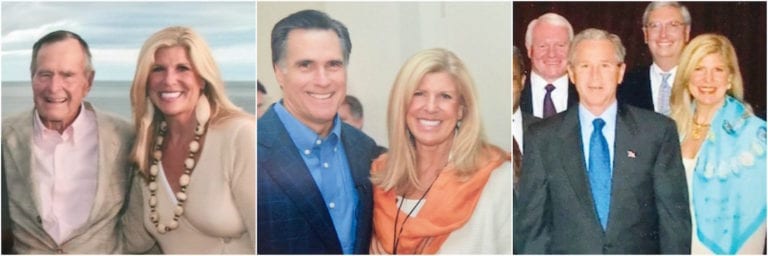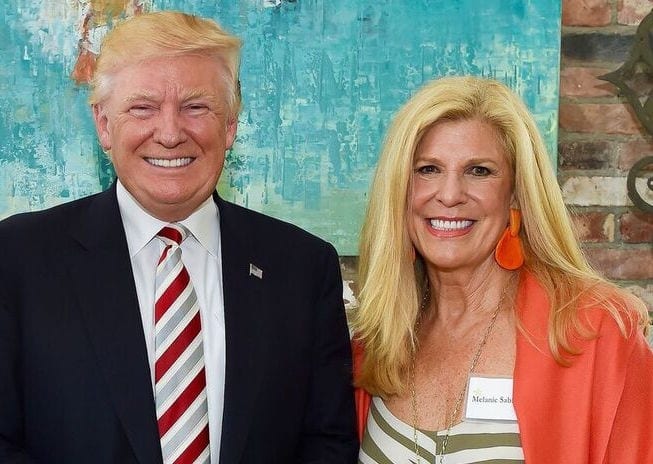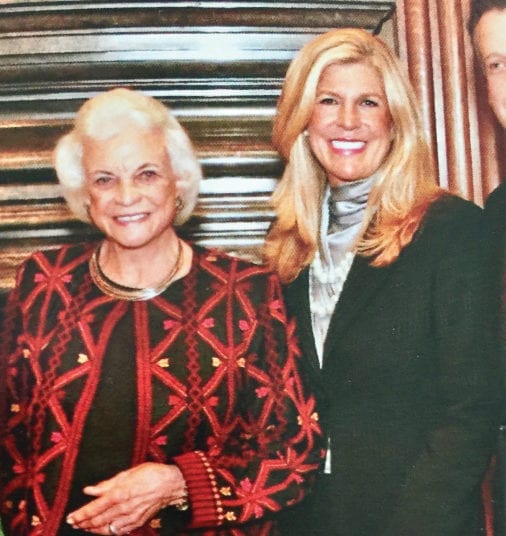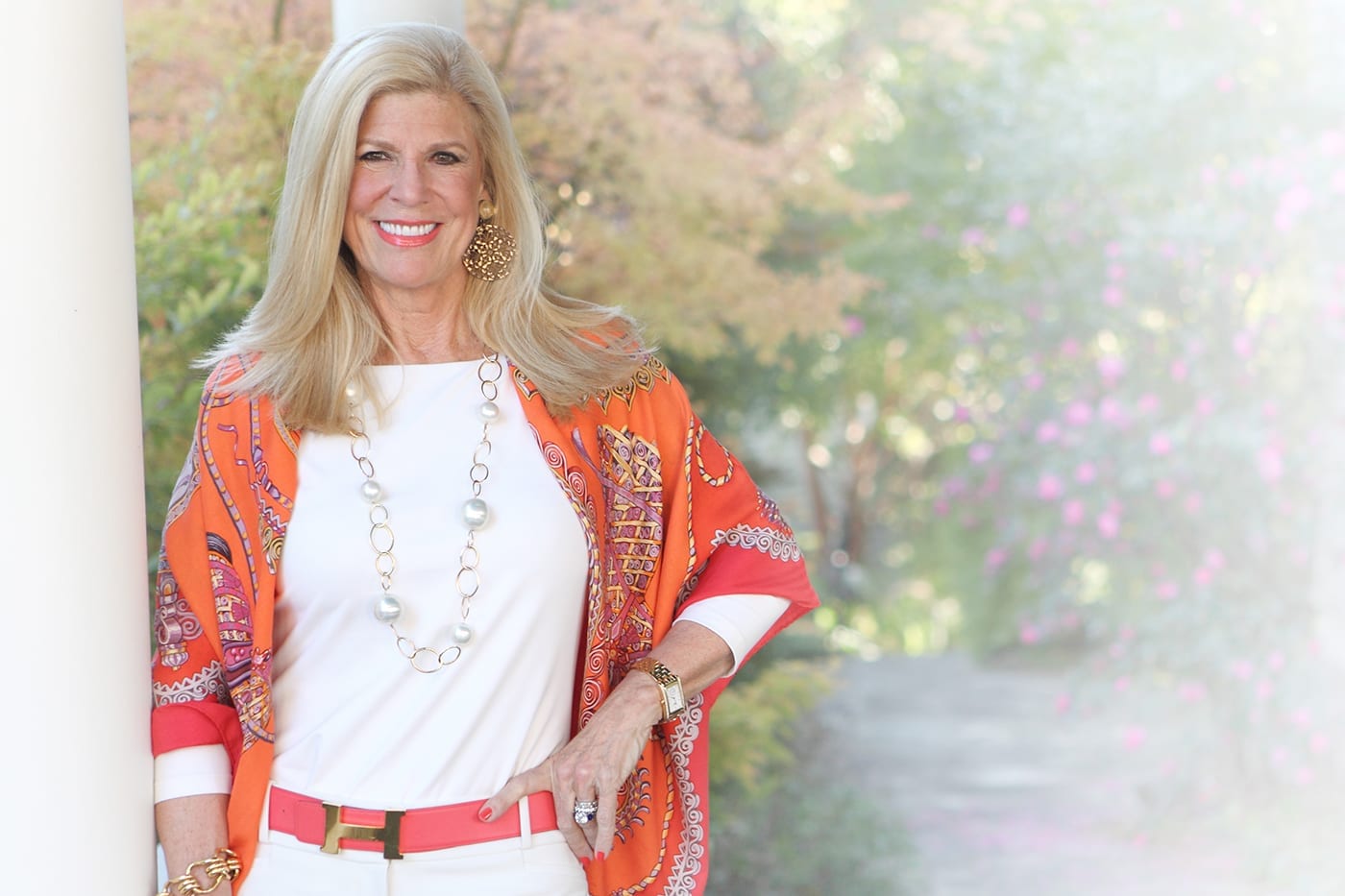Former White House official shifts her career success to philanthropy
Of your successful and varied career, what was your favorite post and why?
Without question, it was vice-chair of the American Red Cross, and what an honor to be asked to serve on that board. Number one nonprofit in the world. The number two brand next to Apple. We are in 180 countries, and we are the greatest humanitarian organization in the world. I had just left the White House. I was the deputy administrator at the Small Business Administration, and my very close friend, who was chairwoman Bonnie McElveen-Hunter from Greensboro, asked. She said, “Melanie, I need you. I need you because we do not have a fundraising program that is really working well. People cannot write checks fast enough when we have a disaster, but we do not have a non-episodic fundraising program. I want you to start it, and let’s do it with women.” Wow. We had done this together years before beginning in 2000 for the United Way. We took that template, and it was the most successful launch in the history, the 135-year history, of the American Red Cross. Women.

Melanie Sabelhaus shared Washington’s political circles with several illustrious names, including former Presidents George Bush and George W. Bush and former Mass. governor Mitt Romney. Sabelhaus acted as deputy administrator at the Small Business Administration under George W. Bush.
In philanthropy, why do women give?
It’s interesting. I would say — and I’m going to flip that for just a minute. The reason women were not giving is because they weren’t being asked. That’s what we determined. When we would ask women, “Will you join me?” We found those to be the most powerful words. “Will you join me and invest in … the United Way or American Red Cross or Alzheimer’s Association?” They had not been asked before. When we asked, they said, yes. Before, it was always Mr. and Mrs. Robert Sabelhaus as a couple. Suddenly, it was very exciting, because women gave and did so for a couple of reasons. Number one, because it resonated with them. Women give completely differently than men. Women want to get their hands on it, their hearts into it. You know, we will sit there, and we see a client that tells us their story and thanks us, we cry. You can’t see a bunch of men doing that, can you? I mean, it would never happen. Women are interested in what’s going on in the building, and I always say to the guys, “And you want your name on the building.” The women of today are passionate, they are committed, they are change agents, and they are leaders and what you’re seeing happen. This is a very exciting time since I began my career in philanthropy. Women are sitting at the table. They are not only board members; they are board chairs, and they are making it happen in a way that we’ve never seen before.
Women and men give for different reasons, why?
We want to know what’s going on in the building and what women want to do is make a huge impact. Timing is also very important in a woman’s life. Take, for example, young professionals. When you look at the millennials today, what you’re seeing is they say, “I don’t want to feed a child. I want to eradicate hunger. I don’t want to inoculate a child. I want to eradicate, you know, measles.” Young people are becoming doctors and going into Doctors Without Borders. When you look at women, no matter what stage of life they are in, those who have families or women who are in the prime of their life as a career woman or a stay-at-home mom, if the ask resonates with them, they give. And they do so if they are passionate about the issue. Quite frankly, if the right person asks me, and I truly believe in the cause, if you lay out a business case and tell me what the return and outcomes are going to be, then I will invest. Women want to know “why does it matter,” and “how can I make a difference.” That is how we look at it. I call it the three T’s: your time, your talents, and your treasure.
With women, do you see “the ask” is more relationship-based or cause-based?
I would say it’s both. Because if I look you in my eyes and you and I have a relationship, and you understand the issue and passion and the fact your joining will make a difference, you give. We all have our causes, but if you see I am passionate, it’s a clear mission and vision, you see exactly what we’re going for, and it really clicks with you, you will join.

Melanie Sabelhaus with President Donald Trump.
Do you feel that it’s easier to ask a woman or a man?
I don’t think there really is a difference. To me, again, it’s the relationship. Everything is relationships. You know, there’s no question about it. But women especially because they want to get their hands on it, their hearts into it. This is an exciting time for women because we are, without question, the economic powerhouse of the 21st century.
Tell us about the 11 years you served as CEO of Exclusive Interim Properties.
Exciting time for me in my life. My day job was at IBM. I was there for 16 years, and I was a marketing executive. My husband and I were moving every two to three years. He was with Merrill Lynch. We had just moved to New York City. The first thing we had to do was find housing, and there was no interim housing. None. I did what any smart woman would do. I moved into the Plaza Hotel with our kids, and our daughter thought she was Eloise. I was the manager at 57th and Madison for IBM while my husband was at Merrill Lynch and Wall Street. But, there was no Mr. Coffee, no washer and dryer … I thought, tire kicker philosophy, here is a business opportunity. Then we moved to Baltimore, Maryland. So, again, I found us in a hotel. I kept my day job and started the Exclusive Interim Properties business. Deep down in my heart I took everything I learned from IBM. Everything. Customer service, respect for the individual and targeted marketing. We built the business ground-up. And it was one of the most exciting things I’ve ever done because I was able, in that period of time, to end up doing an IPO. I had an all-woman team, except for one man, and he was in our warehouse. But we provided interim housing for professional sports people on temporary assignments to executives. We did a merger, and it is now the largest interim housing company in the world called Bridge Street Accommodations Worldwide.
Talk to me about hiring people. How do you hire?
I was a recruiter for IBM and, in sales, the one thing I looked for was the fire in your belly. You can spot that on someone the minute you sit down with them, and everyone can display it differently. While I appear outgoing and gregarious, you will have other people who sit there quietly but still have it. They are excited. They are focused. They are driven. I want to see that. I want that fire to come out. It was always my number one criteria when I was looking at candidates. Of course, I look at their experience to see what track record they have had. I look to see what they bring to the organization, perhaps, that we didn’t have. I think unique skills coming in are important. Being a team player is critical because my philosophy in management is that people will support what they help create. We would sit down together and knock it out. We would identify our goals, recognize people for achieving those goals, and together we’d go for it.
How important was loyalty? You never mentioned that.
Loyalty’s very important. Quite frankly, I can tell you this, one hundred percent across the board, I never had a disloyal employee. From my IBM days, all the way through my own company and even going to the White House, you know, working for President Bush and the administration. I really think you can develop a vetting skill. If people have trust and confidence in you, if they believe in you, if you lay out a vision that is crystal clear that they can fall in love with. That’s what I always did, and then they “were in.” And if they were not, they probably were not right for the job, and they moved on.
What is your favorite philanthropy?

Sabelhaus with friend Sandra Day O’Conner, former associate justice of the Supreme Court.
But without question, United Way. It’s almost as if it is my home. It is where I started. How can I say this? It is when Bonnie and I got together, and she said, “Melanie, women are where it’s at. Let’s go after them.” In business, you learn to follow the money, and she was so right because, in philanthropy, you follow the money. And let me just run through, if I can, a couple of statistics that prove why. Again, women were not being asked, and we started asking. They said, “Yes, yes, yes.” Number one, women are the fastest-growing segment in the U.S. economy. Second, we are starting jobs at twice the rate of men, staying in business longer. Women of color, six times. We manage 83 percent of the household income. But here’s the important statistic. Women are responsible for purchasing 85 to 95 percent of all goods and services that are sold in the United States of America. That’s over $6 trillion, and it can’t all be shoes. We are buying everything. We’re buying houses, cars. Women are in a decision-making role today. We have emerged. We are at a point in our lives where we are, in fact, running the world. If you even look at the government, we will be present in leadership in all the power countries except for China and Russia. If you look across the gamut, while we only have 22 CEOs of Fortune 500s, women are still leading the way. $130 trillion is rolling from one generation to the next. It’s going to end up in our hands because we live five years longer than men. Because of that, we must be good stewards for our families, for our communities. Women are now having the confidence, and I got to tell you a quick story because I think this says it all. It’s an American Red Cross event, and we are at the Supreme Court. I have 450 women who are all $10,000 donors. That day we decided to take it up a notch. We decided to ask for a hundred thousand. Let’s start really playing in the bigger league. These are major gifts now. I said to nine ladies, “Who will join me?” It was our council meeting, which represents all the states, and I had nine women say yes. So, that night, there I am. We had Justice Kennedy just leave. I stood up and I said, “Ladies, tonight is a big night. This is a once-in-a-lifetime opportunity. We are announcing something. You can be a founding member tonight of the Bonnie McElveen Society,” and she had no idea we were doing this. I said, “So, ladies, here it is. I have ten ladies who have already joined me. Will you please step forward? Who in this room at this moment will stand up and invest $100,000 in the American Red Cross and our Tiffany Circle?” You ready for this? Sixty-one women, you heard the squeaking of the marble, 61 women jumped up and one man and then he pushed his wife down because he was with her. We laugh to this day. Stew Leonard. $6.2 million on the spot. No one called home to say, “Honey, can I make this investment?” They made the decision on their own. What we are finding in philanthropy is that it’s the Mrs., you call for the appointment with the man. Then you need to sit down and have the couple present. It’s a joint decision, but we’re seeing women are really becoming the leads on the gifts.
If you could ask God one question, what would it be?
God, why did you bless me the way you did with so many gifts and others that are less fortunate don’t have those opportunities? It’s crazy; I think about it every day. That’s probably another reason I’m so committed to what I do. I want to help change lives and give people the opportunity that I’ve had in my life to live up to your potential.
Are you afraid of anything?
You know, it’s funny you bring that up because I would have said no maybe a month ago. Most recently, I’m 68 years old, and I’m always looking forward. My father taught me never look back. You can’t change the history. Look forward. I say to myself, “I want to keep this up.” So, I reinvent myself. I’m also now a consultant in philanthropy. I look for different opportunities, and I just want to make sure because I think this is what keeps me young at heart, keeps my ideas fresh. I read, read, read. I talk to people. I want to understand why and what’s happening in this world. I just thought that. I thought, “I hope I can keep doing that.” I also hope my health will allow me to keep doing that.
It is sustainability and maintaining good health?
Yes, it is. It is.
Your legacy, what would that be?
Melanie Sabelhaus. She was a big and bold thinker, and she brought me along, and as a result, we have made an impact on this world. We have changed lives. We’ve saved lives, and it’s my greatest gift.

